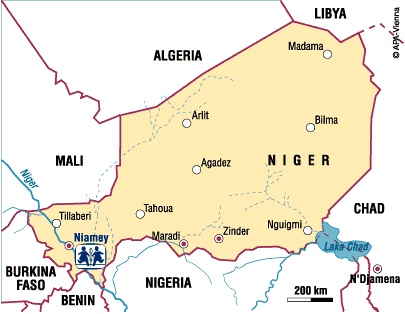Famine: Emergency Relief in Niger and Mali
21/07/2005

To donate to emergency relief in Niger please follow the donate link in the menu box and specify "Niger" in the intructions.
21/07/2005 - Up to a third of Niger's population suffers from food scarcity, every day children die from under nourishment. SOS Children is well established in the country since 1993 and well placed to spend money wisely where it will help most. SOS Children has an emergency relief programme for children in danger of dying from acute starvation in the region of Tahoua; the organisation also distributes foodstuffs and relief supplies in Mali.
Niger (two thirds of the country's surface is desert) has been struck by severe famine as last year's crop was destroyed by lack of rain and a devastating plague of locusts. The looming threat of food scarcity crisis had been predicted months ago; however, desperately-needed relief is only coming in slowly. It is feared that the situation will aggravate in that direction in the months to come and that thousands of children in the Sahel zone may not survive.
Up to now, SOS Children had been active in the capital of Niamey where the organisation has been running an SOS Children's Village, a kindergarten and a school since 1993. There is a secure supply situation around Niamey; however, only 19 out of 106 country districts are not considered to face a critical food supply situation. One of the crisis regions is around Tahoua, a town about 550 km north-east of Niamey, where SOS Children is currently involved in preparation work for building a second SOS Children's Village.
SOS Children has started emergency relief activities in the village of Muntchéré near Tahoua. A food programme to benefit about 9,000 children, some of them orphans, is currently being run. Talks are ongoing with local authorities on degree, kind and duration of relief measures.
Grain sacks were also part of the relief goods distributed in Mali - Photo: SOS Archives Tahoua is a town with about 140,000 inhabitants. Like the entire country of Niger, this town also struggles with grave economic and social problems aggravated by extreme climatic conditions. Despite enhanced development efforts made, the country still rates second-to-last in the country statistics. Nearly half of the population is aged below 15 years, the illiteracy rate amounts to an astronomical percentage of 82.4, average life expectancy is 42 years; besides, HIV/AIDS claims more and more victims particularly among the middle generation.
As a result, the overall situation of children is dismal, if not hopeless, and there is a steady increase in the number of orphans due to AIDS. More than hundred orphans will find a new home in the new SOS Children's Village, construction of which will start in September. Many NGOs are active in the region, but none of them takes care of these children who are not provided for.